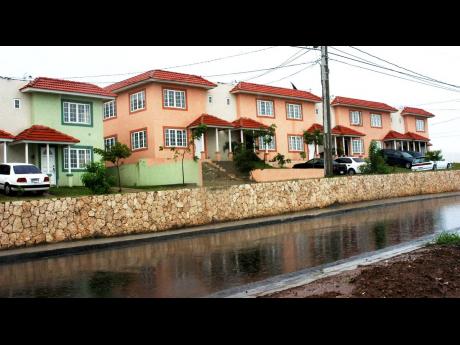COVID softens real estate for renters but sale prices rise
If you have been contemplating moving out of the family home into your own rented space, then 2021 might just be the year to make the move, as early forecasts by the Realtors Association of Jamaica (RAJ) are that rental prices could continue to trend below usual market levels, pulled down by the economic effects of the ongoing coronavirus pandemic. That’s good news for renters and not so good news for landlords, who may be looking to a successful vaccination roll-out to stem the worsening economic repercussions of the pandemic on real estate.
The picture, however, is less grim for sellers of property as growing demand has sent sale prices higher.
Business across the industry took a turn for the worse from as early as April, shortly after the government announced the closure of the country’s borders in an effort to contain the spread of COVID-19. April also marked the beginning of declining sales, and in some cases, no revenue at all for various other businesses, triggering a domino effect of job losses, pay cuts and furloughs.
Short-term rentals like Airbnb nosedived to occupancy rates of 20 per cent; and while long-term rent showed greater resilience to the economic fallout, things were also starting to tighten at that end of the market, too.
LENIENT LANDLORDS
Both commercial and residential landlords responded to the changing economic climate by offering tenants a deferral on rent, and in more generous situations, a waiver on at least one month’s payment. Pulse Investments Limited was one of the first businesses to publicly announce that it would waive April’s rent payments for its 46 commercial tenants “in the spirit of community,” its management said. Where that wasn’t an option, tenants – particularly single occupants – were forced to relocate to cheaper spaces or in some cases, return to the family home.
“Real estate remained resilient throughout the pandemic, but in the higher end of the market we have seen some adjustments. Rental rates have trended down by 10 to 30 per cent, and Airbnb, which is short-term rental, was seriously affected,” new RAJ’s president, Donovan Reid told the Financial Gleaner, summing up the performance of the real estate industry in 2020.
Reid contends that if Jamaica doesn’t get some relief from COVID-19’s impact on the economy, rental rates might continue their downward trend.
“Airbnb will be affected because nobody is going to want different people to be going in and out of the property while we are still dealing with COVID-19. We might have to wait a little bit to see the rental market resuming,” he said.
It’s a different story where property buying and selling is concerned. House and land prices are going up and are expected to continue doing so for some time. Reid explains that the rising price of real estate for purchase during the 2021 will come from demand still outstripping supply, as well as from the devaluation of the local dollar against its US counterpart.
“Foreign exchange will play a big role in real estate prices, because quite a few elements within the construction sector comes from overseas. We have also taken note of rising prices for development land, which can be used to construct apartments, condos and town houses,” the real estate association head said.
He adds: “We think that reflects the change in density allowed for development, and with the increase in demand for high-rise buildings, we don’t see prices falling. We are not going to say it will exponentially rise, but we don’t see it falling.”
Commenting on how the shift to remote work could impact where potential buyers look for their new homes or new places of business, Reid believes that the demand for property outside of Kingston will continue to rise. But whether or not developers move to adjust the design of development properties to include home-office space for Jamaica’s changing business model, will depend on if potential buyers are willing to pay for the additional space.
“With or without COVID-19, affordable houses for young professionals will continue to remain outside of the urban areas. As it relates to more square footage to include a home-office space, I think the developers are going to look at the cost to do that. What people are looking for are habitable units, especially on the lower end of the market. If it’s a two-bedroom space, you have to decide how you will configure that space to suit remote work,” according to Reid.
Real estate investment and development company Proven REIT, which partners with Matalon Homes for real estate development, has announced that it will be reviewing its design plans to capture what may become new norms for the real estate industry post-COVID-19. Proven’s Braemar development in St Andrew, which, before COVID, was slated to be launched in July 2021, was priced between J$21 million and J$42 million.


